#postage stamp poem
Explore tagged Tumblr posts
Text
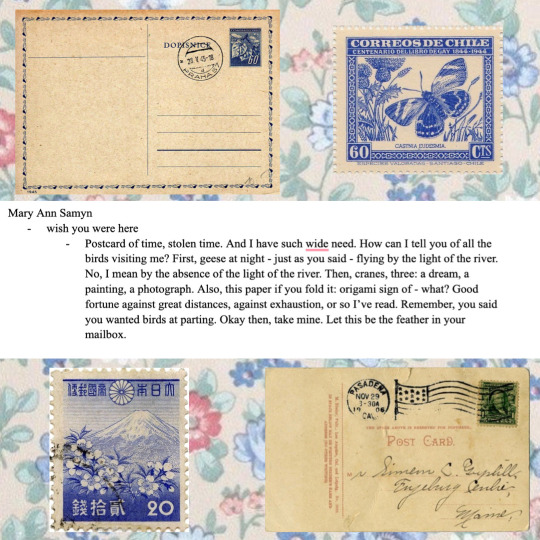

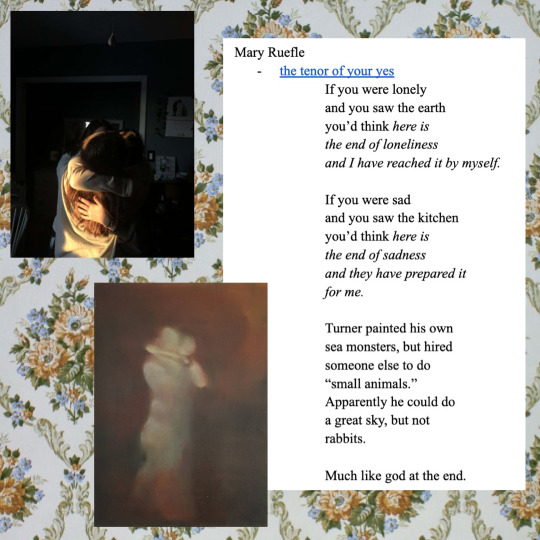
ephemera
mary ann samyn//konstantin simonov//elena yushina//frederick childe hassam//mary ruefle//charis psachos
#postcard#postage stamps#web weaving#poem#poetry#collage#longing#lovers#ephemera#ephemeris#marry ann samyn#konstantin simonov#elena yushina#frederick childe hassam#mary ruefle#charis psachos
33 notes
·
View notes
Text
resolved, hushed to silence
winter gray
snow white
cold quiet
settled river, ancient peace
#poetry#spilled ink#napowrimo 2024#napowrimo#concrete poetry#prompt#find inspiration in a postage stamp#I picked a Japanese stamp of Kenroku-en Garden because the art really spoke to me#and then I decided to write the poem in the shape of the stamp#so now it’s a concrete poem too
7 notes
·
View notes
Text

100 booklets $300.
5 notes
·
View notes
Text
Our true feelings about race and identity are revealed in six words
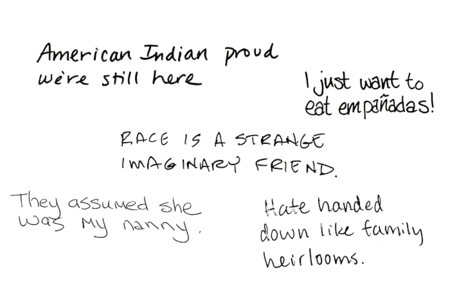
This is a poignant article about a project that Michele Norris started that tapped into people's thoughts about race in a profound way--using only six words. This is a gift🎁link, so anyone can read the full interactive article, even if they don't subscribe to The Washington Post. Below are some excerpts from the article:
I have always cringed when the accusations fly about someone allegedly “playing the race card.” It’s usually a proxy for “You’re making me uncomfortable, so please stop talking.” Or a diversionary tactic used to avoid having to speak about race with any kind of precision or specificity. A shorthand for “Just shut up.” And so, in 2010, I flipped the script, turning that accusatory phrase into a prompt to spark conversation. I printed 200 black postcards at my local FedEx Kinko’s on upper Wisconsin Avenue asking people to condense their thoughts on race or cultural identity into one sentence of six words. The front of the cards simply read:
Race. Your thoughts. 6 words. Please send.
I left the cards everywhere I traveled: in bookstores, in restaurants, at the information kiosks in airports, on the writing desks at all my hotels. Sometimes I snuck them inside airline in-flight magazines or left them at the sugar station at Starbucks. I hoped a few of those postcards would come back, thinking it would be worth the trouble if even a dozen people responded. Much to my surprise, strangers who stumbled on the cards would follow the instructions and use postage stamps to mail their six-word stories back to me in D.C. Since my parents were both postal workers, this gave me an extra thrill. Here I was, doing my part to support the Postal Service. Who says snail mail is dead? Half a dozen cards arrived within a week, then 12, then 20. Over time, that trickle became a tide. I have received more than 500,000 of these stories — and more arrive every day, though the vast majority of submissions now arrive through a website portal online. They have come from all 50 states and more than 100 countries. Though limited to six words, the stories are often shocking in their candor and intimacy. They reveal fear, disappointment, regret and resentment. Some are kissed by grace or triumph. A surprising number arrive in the form of a question, which suggests that many people hunger not just for answers but for permission to speak their truths. It was amazing what people could pack into such a small package:
Reason I ended a sweet relationship
Too Black for Black men’s love
Urban living has made me racist
Took 21 years to be Latina
Was considered White until after 9/11
Gay, but at least I’m White
I’m only Asian when it’s convenient
To keep the conversation going, I created a complementary website for the Race Card Project, where people could submit their six-word stories online. Over time we added two words to the submission form: “Anything else?” That changed everything. People sent in poems, essays, memos and historical documents to explain why they chose their six words. The archive came alive. It became an international forum where people could share their own stories but also learn much about life, as if it were lived by someone else.
I highly recommend reading the entire article, using the above gift link. As an olive-skinned Italian American, with curly hair, I have often felt like I am a walking Rorschach test for race. Even though I'm classified as "white" in the U.S., I've had people ask me if I'm a Latina, a Native American, Black, Egyptian, Jewish, and even a South Pacific Islander. Given my history, here are my six words on race.
A book is not it's cover.
I welcome people adding to this post their own 6 words on race.
#race#six words#feelings about race and identity#martin luther king day#michele norris#the washington post#gift link
39 notes
·
View notes
Text
Day 18: Pining
Going with 1 prompt today. Special shout-out to my twin for giving me the idea. (You know who you are. 😉)
Phoenix begins to find strange envelopes in their mailbox.

Divider by: @silkholland

NOTE: The poems mentioned throughout this fic have been taken from real poems written by people. The credit to the poems told within this fic don't go to me or my f/o. Full credit goes to the original authors of these poems, and I don't wish to ever steal any of the credit for what they wrote.

....Weird...
Phoenix stood outside their house, leaning slightly to the right so their elbow lightly propped up against the top of their mailbox.
An unusual envelope held within both hands.
They didn't know when it had arrived, but it seemed pretty new. The envelope itself seemed to have been made by hand, with a square scrap of scrapbook paper. Decorated with a light, almost mint, green colored background with a violet pattern across it.
A single heart sticker sealed the envelope. Its position up on the envelope a bit cricked, as if it was left there by either a nervous or energetic hand.
Other than sealing the envelope, the sticker had another purpose. A single yellow dandelion, not fully bloomed yet and slightly wilted, sat between the sticker and the paper of the envelope.
Phoenix took care to peel the sticker, making sure not to break the dandelion's stem and, holding it on their hand for a few seconds, ended up deciding to tuck it between one of their ears. Patting it gently to make sure it stayed in place. They wanted to make sure it stayed safe, while they looked at the contents within the envelope. Even though they didn't know who had sent this.
Before opening the envelope, they looked around the outside of it one more time. No address anywhere.
No address, no name, nothing to help Phoenix find out who had sent this....
Phoenix's mouth twisted in confusion. A bit hesitant at first,before they finally unfolded the envelope.
A single slip of paper fell, fluttering down towards the ground.
They gasped. Grabbing it in one hand before it touched the ground. Cringing a bit as they felt the paper scrunch up a bit within their tightened grasp.
Straightening their posture, they gently tried to un-crinkle the paper, before reading.
It seemed to be a letter. A mix of sweet nothings with an excerpt of a poem at the end. This is the part that particularly stole Phoenix's attention.
It said:
"Our hearts are so gentle, so pure. I'll keep loving you, I know for sure." - Mohit
And that was it. Besides the words that filled the paper above the bit of poem, there was nothing else added. No names or initials at all.
Phoenix felt.... Emotionally numb. They weren't sure why, but the way everything was written was so... Familiar, but new. They could have sworn they saw that hand writing somewhere before, but the words said within it came with a type of.... Elegance and such a deep love that didn't seem to be fully recognizable to them.
They took a deep breath, and sighed. Gently folding the letter, they walked back into the house. Standing in the doorway temporarily to look around outside for any signs of this mystery person, before closing the door behind them.

The next few days were similar as the first. Soon, Phoenix would end up checking the mailbox every day due to the pure anticipation and curiosity of it all.
Each day they'd open their mailbox. Each one enclosed within a handmade envelope made from a square sheet of scrapbook paper, each one with different flower patterns. Sometimes there'd be a heart sticker sealing the envelope, other times it would be a random postage stamp that depicted different animals or plants.
A leaf or a single flower would sometimes be stuck up on the sticker, while on other times small paper confetti in the shape of flowers or hearts. The confetti falling down towards Phoenix's feet like snow.
Phoenix would end up picking up each piece, and placing the confetti into a single sealed bag. Feeling like it would be disrespectful to let this person's dedication to their craft go to waste.
As for the letters themselves, they'd continue to stay nameless. The only names being the ones that ended the last poem at each letter, giving credit to the original author from which the excerpt of the poem had come from.
Each poem itself slowly becoming more and more romantic.
For the rest of the letters, the parts that were written before the poems, Phoenix could never seem to be able to place a finger on where they'd recognized that hand writing from.... But this person's words.... Each loving sentence becoming more intimate as time went on.... They'd begin to fill Phoenix's heart with a feeling they didn't feel before. So much romance on a day to day basis.... It was overwhelming. The passion this person gave in their letters....
Phoenix would end each day telling their partners about these letters. They didn't notice it, but Aza and Thimble would give each other this knowing look whenever Phoenix wasn't paying attention...
And then.... It all stopped. No more letters. Nothing to ever signify that the letters had even arrived at all, in the first place.
Phoenix wouldn't notice it at first, but their heart would slowly fall.
Did something happen to this person? Were they hurt? Sick? Did Phoenix upset them somehow? Was this all some kind of mistake??? Was Phoenix mis-reading what the person had been writing to them?
Phoenix would find themselves on some days re-reading the past letters that had been given to them, on their free time. Silent. Brooding, in a way that gave off their obvious curiosity towards this situation.
This whole situation was just..... Unusual.

"Come here."
The voice was a bit softer than usual. A bit shaky too. Strange...
Phoenix looked up, snapped out of their thoughts. Thimble stood before them, dressed up in one of her nicer looking outfits.
Something seemed to be on her mind, but Phoenix couldn't figure out what.
"To where?" Phoenix asked, brows furrowed in confusion.
The house was a bit more silent than usual. Aza was at a leg modeling job. This new company was a bit smaller than the others he sometimes worked with, and wasn't as old as the others to. They seemed to really like his work though, and had asked Aza to stay a bit longer, to discuss a possible modeling job with them in the near future.
Due to this, and Thimble's strange silence, Phoenix couldn't help but feel a bit more anxious than usual.
All Thimble did was reach out a hand, letting Phoenix place their hand in his, and gently pulling up their partner to a standing position, before leading them outside, to the back of the house.
It was near night time. The air a bit chilly, but not uncomfortably so. The sky lit just enough for you to still see clearly.
A small section of the yard held a fold out table and 2 chairs. The table decorated with a tablecloth the color of moss, and the chairs topped with cushions of the same color.
A small cluster of various sized candles sat on the center of the table. Phoenix was pleasantly surprised that they gave off the scent of sandalwood as the couple walked closer to the table.
They stopped just a few inches from one of the chairs, before Thimble let go of Phoenix's hand, and took a few steps backwards, not breaking eye contact.
It took a slip of paper out of its pocket.
He spoke. Not looking at the paper, but instead seeming to speak from his heart.
His words were full of love and care. Voice a bit shaky, but slowly becoming more confident as his voice became that of someone who'd often recite poetry. (Which he actually would often do, to both Phoenix and Aza.)
Something about these words seemed familiar. Phoenix could swear they heard at least some of these sentences before... That they came across this same feeling they were currently feeling, before...
And that was when Thimble held up the slip of paper he recently took out of his pocket. Flipping it around to show Phoenix the words on it.
Only 15 words were written on it.
"Our hearts are so gentle, so pure. I'll keep loving you, I know for sure." Thimble recited, as Phoenix read the words.
These..... Were the same words written in the first letter they got from their mystery person. But that would mean....
"That person.... That was you?" Thimble gave a slight smile at this question.
Phoenix continued. "The envelopes. The hand writing. Ohhhhh it makes so much sense now!" Phoenix cried out, not knowing how they didn't notice this at the start.
"The paper from your scrapbooking supplies. The... The hand writing..." They had to stop to take a breath. Exasperated at their lack of words, despite having so much to say.
Thimble took a step towards them.
"I thought it could be something to surprise you with... I know you like poetry. And that you haven't had things like this happen to you before. I guess... I thought that maybe it would help you realize more that you're worth feeling loved more than you might tell yourself. It was... Both mine and Aza's idea, but they thought it might be good for the both of us if I were to do most of the work."
Phoenix began to tear up. Thimble did too, up on seeing this.
Phoenix fell into Thimble's arms. Who of which, admittedly stumbled back a few steps, due to how short they were compared to their partner. But he was able to balance the both of them, and held Phoenix close.
"I don't know what to say..." Thimble turned their head towards Phoenix a bit, their partner's voice a bit hard to hear due to Phoenix speaking barely above a whisper.
"Thimb, I..... I really needed this.... Thank you."
Thimble's grasp on their partner tightened as they could feel them begin to cry within their arms.
Thimble's shoulder getting a bit damp from the tears.
Phoenix looked up soon after though, and sniffed.
"Thank you." They repeated, voice just about hoarse.
Thimble took a while to make sure Phoenix was taken care of, before leading them towards one of the chairs. Having them sit down before sitting down in a chair himself. The next hour or so was spent with Thimble serving Phoenix their favorite dishes. At one point they were able to cheer Phoenix up by doing a few different accents. Something they knew seemed to entertain their partner.
At the end of the night, Thimble led Phoenix inside, and to bed. And it all ended when she joined them, both partners holding each other close as they both drifted off to sleep.
Aza would join them soon after. Finally back home and having had some dinner, he made sure to slowly crawl into bed, careful not to wake his partners, and joined in the cuddle. The energy both Phoenix and Thimble gave off was one full of a new found closeness and intimacy at a bigger extent. It was almost irresistible not to join in.
Plus seeing Phoenix's face lightly streaked with dried tears, made him want to join in even more.
Aza could tell tonight was a good night for both of their partners. And their love for both of them only grew after sensing how good of a time they had. They needed this.
Soon all 3 partners laid in bed, lost in a deep sleep, arms wrapped around each other in an embrace that would, if they had the option to, never break apart.

Taglist:
@faerie-circle-ships
@sennamybeloved


#f/o#thimble#s/i#phoenix#3 frogs in a trench coat#self ship#selfshiptober 2024#the hound#the field mouse
3 notes
·
View notes
Text
by happenstance I read this poem today and now it's rattling around inside my skull like it has the place to itself
(if you're a cryer like me, be warned)
ALZ Ghazal
By Rebecca Foust
For my sister
It’s the same house, same rugs, same wallpaper, and bedroom repeating;
same dresser; same rocker. Same window and frame, repeating.
Same birds at the pane, same pots and pans, and—on the alarm clock,
the wall clock, the phone clock—the same time, repeating
each hour’s increment in a lived life. But, This is no life, each day like
before and to come, repeating.
The furniture set in a known pattern. The rugs there, like always, inking
the blueprint of home, repeating
jewel tones on the floor, but what was once north–south now seems to lie
east–west—who moved the rugs?—in sum, repeating
the familiar, but sideways. Your inner axis has shifted, the landmarks
somehow changed but the same, you repeating
Why do they keep moving the rugs? The desk, the chair, your keys?
Home its own balm, repeating
the familiar, but neither keys nor your purse can be found—I know
I just had them—repeating
the questions yields the same, that is, no real answers. Your sense of taste
gone, like eating chum, repeating
the same million small motions: fork to plate then mouth, then back down,
always the same, repeating
the flavor of cardboard. You used to love to cook, that joyous jazz variation-
on-a-theme now a repeating
like pages of musical staffs, xeroxed blank with no notes. Lately, you refuse
to eat anything at all. In a poem, repeating
lines compose a refrain and, echoed again and again, the sum of refrains
is a song. But there is also empty repeating:
zero plus zero plus zero still zero, a void. No accretion, no growth, no life,
no thrum. Then again, birds—some, repeating
one clear note, are said to singing without tune—and, the same set of sounds
from a beaten drum, repeating
means nothing and everything at the same time. The gene runs in families
and can be followed like breadcrumbs, repeating
the precise map for getting lost, down through generations. She took the same
route to work on the town tram, a repeating
my sister relied on. We rely on a plum to taste purple when our teeth break
its skin. Some numbers go on ad infinitum, repeating
that reminds us of architecture and God. Rings of a tree, whorls of a shell,
sections of a lime, repeating
a sequence that re-enacts growth and change. Meiosis, mitosis, Eve cleaved
from Adam, other kinds of repeating
so life can go on. We are “pattern-seeking animals,” Hass says, and even
atheists pray in a jam, repeating
lessons learned as a child: “Now I lay me” like the promise of mercy, like mercy
itself, soothing and warm, you repeating
your talisman against terror. After your nap, I worry you’ll wake confused,
but then you resume, repeating
Where are my keys? Why do they keep moving the rugs? Always theft and loss
the theme, repeating.
They say you’ll forget my name, and your own. How to talk, small mercy
then, you no longer doomed to repeating
your aching questions. They say you’ll forget how to swallow, to breathe—
O God, will you forget to breathe?—just succumb, repeating
the pause in place of the heartbeat? The doctor says keep things simple
and flat, no drang or sturm, repeating
“Is it nice there today,” and “Have the tulips bloomed,” conversations dull
with the same datum repeating
catechism and cliché. You no longer work on your dollhouses, potting trees
the size of your thumb, repeating
postage-stamp paintings on walls, building one-inch-to-the-foot the lavish life
you never had or presumed, repeating
a litany of loss enlarged from what-was to what-will-never-be. The Christmas
tree shadowbox in simulacrum repeating
the childhood obsessions. Some of your dollhouses have tiny dollhouses
within them, repeating
themselves in infinite regression. All that helpless sap and surge of creation,
your xylem and phloem repeating
what to make of a diminished thing. You say you’ll burn them come spring,
without reflection or qualm, the future repeating
and eating the past. It’s happening so fast: a page torn, a book lost, then
whole libraries gone dumb, repeating
erasure until only erasure remains. O trochee, lilting your 10-beat line.
O river, O iamb repeating
the tide. Bishop called loss an “art.” I last saw you at home in October,
a glorious autumn repeating
saffron and scarlet against azure sky. Outside now, a robin taps at the pane,
ravished by her own image, an eye-rhyme repeating—
there’s been one bird each spring. Some beat their beaks bloody and die,
some stay for days, numb with repeating
their broken routine. Who moved the keys? Who moved the goddamn keys?
Your patient husband is grim, repeating
they’re-in-a-safe-place-so-we-can-keep-you-safe. We are all of us trapped
under a great dome repeating
our words and the cries of wild birds. This is harder in some ways, he says,
than Vietnam, repeating
his pledge to stay till the end. He tries to give you small pleasures, picking
and handing you the plum repeating
all you can recall of lush purple juice run down your chin, but at best,
it’s a dim meme repeating
as holograph plums eaten before. Soon, where are my keys will dwindle
to where keys, the totem repeating
as keys, then just key—what matters, the way out of labyrinth and code.
A chant or psalm, repeating
open vowels like water or rain. Luck—the river in poker, the silver ball
spun at the wheel’s rim—can be repeating
until it turns, and isn’t it possible to hear a persistent tune as anthem,
not ear-worm? Can’t repeating
strengthen a seam, or knit a long row? After you fell, I imagined you there
on the floor, the refrigerator’s hum repeating
its cold comfort until the ambulance came. Your husband cradling you
on the linoleum, repeating
presence in absence in presence in absence—cognitive dissonance—
or an inscrutable charm repeating
its mysteries. Your hip and arm are mostly healed. The house is still there,
but an interior door slams shut every second, an alarm repeating
its warning: all doors soon will be sealed. Where we stand in an earthquake
is an empty doorframe. Soon, repeating
itself will disappear: all language flown, a slaughtered lamb,
a shattered paradigm. Will your repeating
heart just—miss its cue? Will you forget how to swallow? O Fates, come, come,
/ Cut thread and thrum, repeating
its end-times refrain. Your jacks and pick-up sticks—you still love any game
—played now with your left arm, repeating
that makes of small movements an art, like dance. Your little jokes,
like the “ALZ tip jar”—now crammed—repeating
the ring of each coin dropped in. You pull my leg when I call, pretending
to forget who I am, repeating
Becky who? Becky who? until we both laugh, the sounds that sound so much
like crying but with a whetted edge; in time, repeating
a knife against stone will bring forth a terrible blade. O sweet sad funny sister,
you are the bird who flies away in my dream, repeating
its looping script on the blank page of sky. An unhooded hawk, a wild bird
freed. Calling Key? Key? Key?—repeating, repeating, repeating.
Source: Poetry (May 2021)
by way of: www.poetryfoundation.org/poetrymagazine/poems/155783/alz-ghazal
#poetry#ghazal poetry#Rebecca Foust#holy crap not a reblog even#the part where the poet compares cooking to jazz to sheets of empty musical staffs...!! 😵💀 I am slewn
2 notes
·
View notes
Text

morisot - view of england the figure (not to mention the title) but particularly the figure the other side of the gate at the bottom of the garden makes me think of brautigan's poem 'to england' There are no postage stamps that send letters back to England three centuries ago, no postage stamps that make letters travel back until the grave hasn't been dug yet, and John Donne stands looking out the window, it is just beginning to rain this April morning, and the birds are falling into the trees like chess pieces into an unplayed game, and John Donne sees the postman coming up the street, the postman walks very carefully because his cane is made of glass.
2 notes
·
View notes
Text
Halloween Day 14

Today, a poem.
Field of Skulls by Mary Karr Stare hard enough at the fabric of night, and if you're predisposed to dark—let’s say the window you’ve picked is a black postage stamp you spend hours at, sleepless, drinking gin after the I Love Lucy reruns have gone off—stare
like your eyes have force, and behind any night’s taut scrim will come the forms you expect pressing from the other side. For you: a field of skulls, angled jaws and eye-sockets, a zillion scooped-out crania. They’re plain once you think to look.
You know such fields exist, for criminals roam your very block, and even history lists monsters like Adolf and Uncle Joe who stalk the earth’s orb, plus minor baby-eaters unidentified, probably in your very midst. Perhaps that disgruntled mail clerk from your job
has already scratched your name on a bullet—that’s him rustling in the azaleas. You caress the thought, for it proves there’s no better spot for you than here, your square-yard of chintz sofa, hearing the bad news piped steady from your head. The night is black. You stare and furious stare,
confident there are no gods out there. In this way, you’re blind to your own eye’s intricate machine and to the light it sees by, to the luck of birth and all your remembered loves. If the skulls are there— let’s say they do press toward you against night’s scrim—could they not stare with slack jawed envy at the fine flesh that covers your scalp, the numbered hairs, at the force your hands hold?
Mary Karr, “Field of Skulls” from Viper Rum. Copyright © 1998 by Mary Karr.
If you would like to be added to my taglist please let me know!
@dianamolloy @piggledy-higgledy @imdeadtiredtm @joyfullymassivewhispers @caffiend-queen @dangertoozmanykids101 @toozmanykids @myoxisbroken @wrathkitty @punemy-spotted @sillybillieandricky @stupendouslovegardener @sylviefromneptune @acidcasualties
9 notes
·
View notes
Text
The Mini Interview with Victoria Chang

by Natasha Rao
Victoria Chang is continually expanding the possibilities of poetic form. Two of her recent books are a testament to this inventiveness—the poems in Obit (2020) are written as obituaries, and The Trees Witness Everything (2022) adheres to Japanese syllabic form.
Her most recent collection, With My Back to the World (Farrar, Straus and Giroux, 2024), pushes formal play further, borrowing from the toolkit of abstract art by incorporating grids, lines, shapes, and dots. The poems are each in conversation with the work of artist Agnes Martin, using Martin’s paintings to explore themes of art, depression, and selfhood. This is an atmospheric landscape where borders dissolve: between speaker and artwork (“I moved below the line, into the yellow or the blue”), between painting and language (“I am trying to paint in lowercase”), between making and being observed (“Is it possible to be seen, but not looked at?”). Visual art and poetry are intricately connected, and Chang shows us the skein.
I had the pleasure of speaking with Chang about her new collection over Zoom, where we discussed her relationship to Agnes Martin’s work, the possibilities and failings of language, and the meditative quality of mark making.
***
The Rumpus: So much of this book is about the act of making: Agnes Martin describes the way she first sees a postage stamp-sized image in her mind that she then has to scale up into a large canvas. In your case, with the starting point being these large canvases, was there a comparable kind of scaling that had to happen? Or how would you describe the process of making these poems?
Victoria Chang: People sometimes ask me how I write because they think the end result is so clean and organized, so they want to know what comes first. I actually have no idea what I'm going to write when I sit down. In this case, because these were ekphrastic poems, I started with the piece that I was looking at, but I had no idea how the piece was going to influence my own consciousness. Whatever was floating around in my mind at that particular moment entered into the piece, and I’d just move around within that space. Somehow there's an alchemy that happens between me looking and quietly sitting. Writing poems is kind of like meditation, thinking quietly in your own mind. And that freedom of movement is not premeditated at all. For me, that's the beauty of the artistic process.
Rumpus: Many of the poems in the book are accompanied by an illustration of yours. Can you talk about how you made those and what materials you used?
Chang: For me, writing is one kind of mark making—I also doodle, draw, paint. I love using certain pens and I like to use my hands. A friend of mine was educating me on asemic writing at the time, so I thought maybe I'd do some asemic writing with my own poems. Another one of my artist friends was talking about vellum, so I used vellum on top just for fun. And I thought it’s really cool how you can see what's underneath; in some way you’re interacting with what's underneath and changing it, but you can still see the poem. So, I started messing around with that. I was at the Ucross residency, and you’re supposed to write all day, but I can't sit still for that long. So, I wrote in the morning, then had lunch, then in the afternoon I would make these little marks on vellum for hours. And then a deer would leap by, or it started snowing, and it was really nice to sit quietly with music lightly in the background or in my earbuds, and I would just mark make for hours.
Rumpus: In these poems, I really felt the materiality of language, and was reminded that as poets, words are our medium. What do you think about the differences of possibilities for expression through language versus painting?
Chang: I think language is incredible—the fact that we have these little objects that we can move around and shape and use to express ourselves. But I always feel like it's inadequate. And I think a lot of this book is grappling with the inadequacy of language, not only to get at meaning, but in terms of the visual aspect, using your hands. I just feel like there's so much more to expression and the ability to get at something that I'm thinking about that moves way beyond writing and using the alphabet.
Rumpus: One aspect of the collection I really loved was the way visual art and the speaker’s reality begin to blend. The speaker says things like, “I shiver as her brush passes over my brain, flattening my thinking.” To what extent would you say this feeling of permeability has to do with depression and grief, or, is it more linked to a feeling of obsession and throwing oneself into a project? Or both?
Chang: I think it's both. I think why Agnes Martin's pieces moved me so much at that period of my life was because I was so depressed. I didn’t quite realize how depressed I was, but I knew I was dealing with some really hard things. And those lines and grids just spoke to me.
I really think that art can save the world. It's the dumbest thing to say, but I really believe that, at the macro level. And I actually think that art can save an individual's life. At the minimum, it’s transformation. At the maximum, it’s literally saving someone's life.
There are moments in life where we just feel, especially as poets, a sense of, Why am I here? Now I think a lot of young people in particular are feeling this kind of apocalyptic desperation. I think art is the thing that brings us back to the beauty of the world and the joyous occasions. Even if what's being written about is sad, there's a joyfulness in that connection with art that brings one back to the beauty of life.
Depression is not necessarily a bad thing—it's not a sad, awful thing. It's a beautiful aspect of being a human being. And it’s what a lot of people go through at various parts of life. So, I think that it can be a beautiful thing for someone to interact with art that is maybe grappling with some of those harder and sadder things. For me, Agnes Martin allowed me to explore these kinds of feelings—I felt almost transposed, or like I was inside of her grids. Like the grids were around me and cutting through me, and it felt like I was with the pieces in a very sort of spiritual way.
Rumpus: That makes me think about the book’s title. I feel like as artists, we tout the idea of being open to the world. But when you turn your back to the world, so much can open up in your own thinking and work. Chang: Exactly. Everybody wants a piece of the face today, right? Everybody wants to associate the writer with the work or the artist with the visual art. I just want people to take the writing or whatever I made and separate it from me, because I certainly don't feel connected to the writing. I’m just sort of a conduit—language passes through me, that's all.
Rumpus: Can you talk about your use of numbers in these poems?
Chang: My mother taught math in high school and has a mathematical background, and my father was an engineer, so math was everywhere in our house. I love numbers. My mind works very numerically, maybe by training, maybe naturally. And then I looked at Agnes Martin’s grids and they just begged to be counted. During a time of grief, it was nice to literally get a pencil and just count one, two, three, four…et cetera.
Counting was a wonderful experience in interacting with her work, versus just looking. While I'd be counting, maybe I had new feelings or ideas, then I would start writing something about the counting, and then other ideas would appear. I really like that automaticity of writing. And I love the idea of creating situations as an artist where things become automatic and the subconscious flows naturally. I find that to be fun, because again, I'm just a conduit. I’m not an artist with a capital A; I'm not to be celebrated. I'm interested in being like an electric wire where it flows through me and goes out the other direction.
Rumpus: After spending all this time with Agnes Martin, has she changed anything about the way that you move through the world?
Chang: With her, it was like kinship. She’s free inside of her grids, so I really connected to her because sometimes I need form—I'm usually free within some kind of container, small or large. And I feel such little connection with so many people on a daily basis, that when I find somebody, who doesn't even need to be alive, somebody that I connect with on a spiritual level, someone like Agnes Martin and her artwork, I know immediately who those people are. And they were there the whole time.
___________________________ Natasha Rao is the author of Latitude, selected by Ada Limón as the winner of the 2021 APR/Honickman First Book Prize. The recipient of a 2021 Ruth Lilly and Dorothy Sargent Rosenberg Fellowship from The Poetry Foundation, she has also received fellowships from Bread Loaf, the Vermont Studio Center, and the Community of Writers. Her work appears in The Nation, American Poetry Review, The New York Times Magazine, and elsewhere. She holds a BA from Brown University and an MFA from NYU, where she was a Goldwater Fellow. She is currently Co-Editor of American Chordata.
2 notes
·
View notes
Text
Life gives you lemons Because the world is your oyster Bon appétit
55 notes
·
View notes
Text

some kind of poem
[text id: birds / soft carpet under your feet / lights, stretched out / music / braided hair / heartbeats / piano notes one two three four / rocking chairs / lemon & honey tea / blankets / nectarines / laundry, warm / laughter / suhoors and iftars / handmade birthday cards / painted nails / postage stamps hidden in notebooks / hoodie strings / brushstroke sunsets / love / love / love]
18 notes
·
View notes
Text
[naming myself litany, with names redacted]
At work, they call me M---. A good, sensible name. A exquisite-handwriting name.
M--- is the name of a woman who gets things done. M--- is the name of a woman who always has three pens, two spare hair ties, and an extra postage stamp, just in case.
M--- is my worksona.
At home, they call me M------. A good, comfortable name. A jumprope-rhyme name.
M------ is the name of a girl who never learns to be afraid. M------ is the name of a girl who throws herself off of swings, out of trees, into the surprised arms of the world, laughing all the way.
M------ is the sunlight visible in the cracks of my marrow.
There is power in the naming of things.
I name you, self.
I name you daughter. I name you sister. I name you eldest-of-three.
I name you cannot-sit-still. I name you runs-into-walls. I name you talks-too-loud.
I name you reads-too-much, needs-too-much, cries-too-often.
I name you missing-stair, avoided-bruise, test-of-patience.
I name you elephant-in-the-story, child-of-too-many-questions, woman-who-sleeps-with-stuffed-animals.
I name you speaks-in-echoes. I name you thinks-in-gifs. I name you sings-off-key.
lullabye girl. changeling child. woman-of-the-laughing-hands. hush now. hush.
hush now, scared-of-shadows. hush now, ghost-of-a-girl. hush now, poem-afraid-to-be-written.
hush now. hush.
I name you rocks-yourself-to-sleep.
12 notes
·
View notes
Text

100 booklets $300.
4 notes
·
View notes
Text
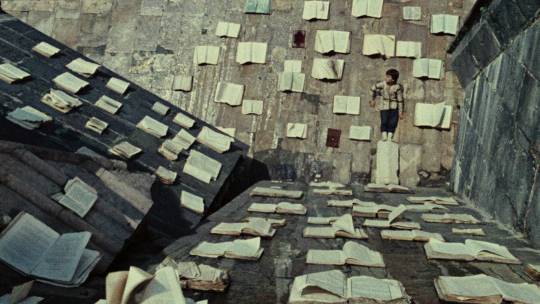


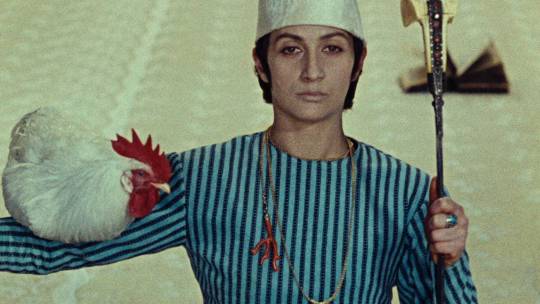
“The Color of Pomegranates” is most simply described as a series of tableaus that recount the life of the 18th-century poet and troubadour turned monk who was known as Sayat Nova (a Persian sobriquet that means “King of Songs”). Born, like Parajanov, in Soviet Georgia to Armenian parents, Sayat Nova was enough of a hero to have the 250th anniversary of his birth commemorated in 1962 with a postage stamp.
In “The Color of Pomegranates,” Sayat Nova’s poems are seen rather than heard. There is some voice-over but little dialogue in an ebb-and-flow soundtrack that alternates wailing folk melodies with choral chanting. The film draws on Sayat Nova’s imagery: angels with flat halos and wooden wings, a pasteboard cloud descending as a vision, the constant repetition of key props including books, silver balls and ornate rugs. Fruits seem to bleed and books to weep. Animals, particularly goats and sheep, are ubiquitous. Impassive actors engage in dancelike gestures while staring straight into the camera.
#the color of pomegranates#sergei parajanov#soviet movie#soviet art#ussr#ussr art#avantgarde#movie#cinematography#archive#sixsixsixnotricks
7 notes
·
View notes
Text
Happy two thousand twenty fourth birthday Autumn - September twenty second
But first etymological climatological meteorological esoterica: The word autumn (/ˈɔːtəm/) is derived from Latin autumnus, archaic auctumnus, possibly from the ancient Etruscan root autu-and has within it connotations of the passing of the year. Alternative etymologies include Proto-Indo-European *h₃ewǵ- ("cold") or *h₂sows- ("dry").
If you reside in the Eastern time zone, then fall officially begins at 8:43 a.m., local time. The start of fall will be at 7:43 a.m. in the Central time zone, 6:43 a.m. in the Mountain time zone and 5:43 a.m. in the Pacific time zone. Despite twittering, uber sputtering kickstarting lyft onset of cool weather argh, another brief daily spate re: forecasting blistering, nauseating, sweltering... ninety degree plus Fahrenheit temperature forecast (along eastern seaboard) courtesy mister summer, who will overstay his welcome hoop fully a more seasonable cooling trend rounds out ninth month (according to Gregorian calendar).
The above lines crafted when poetic endeavor
herewith follows tapped out across qwerty keyboard
when this poem initially written
at least one earth orbit ago.
I eagerly looked forward to crisp refreshing air much more comfortable to weather being outdoors within/out this sequestered enclave postage stamp size geographical area offers respite versus metropolitan denser population centers, the former disappearing open space rather disheartening, but urbanization -
purportedly the definition of progress finds once open farmland more than fifty plus years back crumbling barns now tombstones testimony when people farmed the land, and lived linkedin with rhythms of nature, which only found courtesy said vestiges inevitably razed (similar to boyhood home
324 Level Road) finds yours truly brooding fast paced instant credit karma gratification twenty first century, which small, medium forces at large outfox the time tested imprimatur i.e. latent powers planet Earth unleashes (thank you global warming) decrees final curtain call. Homo sapiens runs rampant wreaking havoc all points of compass already inundated with scorching, melting ice caps, flooding... future generations, yet unborn might avoid predicated on dramatic alternatives fossil fuels already showered Gaia with carbon dioxide as well other noxious poisons though vibrant advocacy evident among students
vocally demonstrating against irrevocable damage, whereby environment and countries situated near sea level take heavy hit, nonetheless... cautious optimism flickers inducing mandatory one hundred eighty degree reorientation regarding eco friendly methodologies to lo mein, maintain, sustain... technological civilization, else quaint existence of thee will be read about in digitized history books.
0 notes
